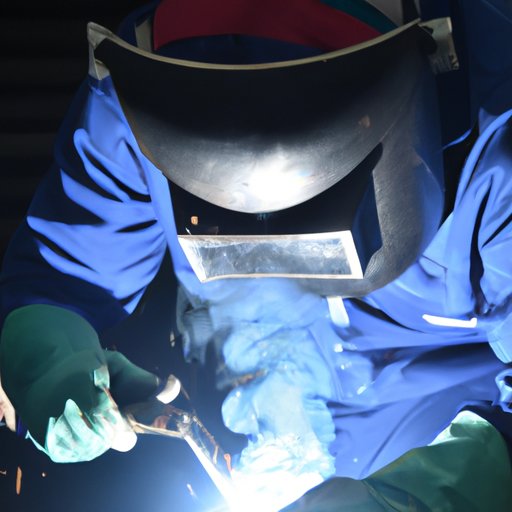
I. Introduction
Welding is an extremely important trade for various industries, including construction and manufacturing. It involves the joining of metals through heat and pressure to create a strong bond. However, for those who are interested in becoming a welder, the process can seem overwhelming. This article aims to provide aspiring welders with a comprehensive guide to help them pursue their passion.
II. Step-by-Step Guide
Before embarking on a career in welding, it’s essential to have the proper education and certifications. Many welding and trade schools offer various programs to aid in learning the skills needed to become a successful welder. Additionally, having a certification from the American Welding Society (AWS) can prove your skills to future employers and increase your chances of employment.
It’s also vital to understand the various welding techniques, including MIG, TIG, and Stick welding. These techniques require different equipment and have different applications, so gaining knowledge in all areas can be beneficial. Safety measures are also of the utmost importance when welding, as it involves working with high temperatures and intense energy. Protective gear such as gloves, helmets, and masks are essential when working in this field.
To gain experience in welding, it’s essential to seek out apprenticeships or internships. These opportunities provide hands-on training, allowing aspiring welders to hone their skills and build their portfolio. Once you’ve gained some experience, it’s crucial to maintain connections within the industry to increase job opportunities and stay updated on any advancements or news.
III. Personal Experience and Tips
As someone who works in the welding industry, I can attest to the satisfaction that comes with creating a strong bond between metals. Welding allows for creativity and precision, and it’s a highly fulfilling career for those who enjoy working with their hands. My advice for aspiring welders is to never stop learning. There’s always something new to discover in this field, whether it be a new technique or a new material to work with.
Building a network is also crucial in welding. It’s important to attend industry events and meet other professionals in the field. This not only provides potential job opportunities, but it also allows for knowledge sharing and potential collaborations. Finally, when starting out in this field, it’s important to avoid cutting corners or taking risks. Safety should always be the top priority in welding, and it’s not worth risking your own well-being.
IV. Pros and Cons of the Career
As with any career, there are both pros and cons to becoming a welder. One of the biggest advantages is the potential salary. Welders who are skilled in their craft can make a comfortable living, with the average salary ranging between $30,000 to $80,000 per year. Additionally, the job outlook for welders is steady, with many industries relying on skilled welders for construction and manufacturing.
However, there are also some challenges to being a welder. It involves working long hours on your feet and in various weather conditions. Welding can also be dangerous if proper safety measures aren’t followed. The daily tasks in welding are repetitive and can be physically demanding, which can lead to fatigue and injury over time.
V. Q&A with a Welding Expert
To provide more insight into the world of welding, we spoke with a welding expert. According to the expert, the most important requirement to becoming a welder is dedication. Welding involves a lot of hard work and long hours, so it’s essential to be committed to the craft. In terms of skills, welding requires a great deal of hand-eye coordination and attention to detail. Lastly, our expert recommends that aspiring welders gain as much hands-on experience as possible, whether that be through internships or apprenticeships.
VI. Highlighting an Inspirational Welder
An inspirational figure in the welding industry is Marsha Murrington. As a single mother, Murrington faced numerous obstacles when entering the field of welding. However, she was determined to succeed and went on to become a welding inspector. Murrington has also worked to encourage young women to pursue careers in welding, highlighting the potential for success in this field.
VII. Conclusion
Becoming a welder requires dedication and hard work, but it can lead to a fulfilling and lucrative career. With the proper education, certifications, and hands-on experience, aspiring welders can build a successful career in this field. And, by staying up-to-date on industry trends and networking with other professionals, welders can create a fulfilling and sustainable career for years to come.





